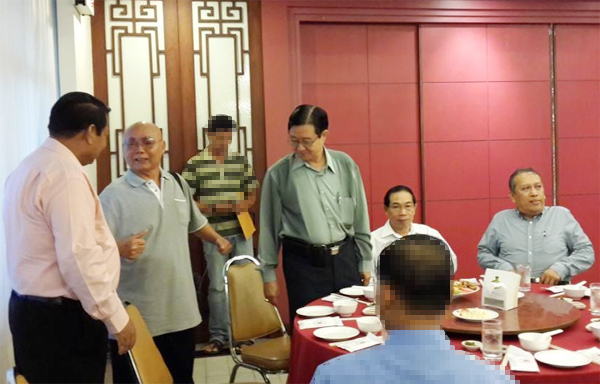According to the briefing at the two-day monthly meeting, 6-7 September, of the Working Group for Ethnic Coordination (WGEC), the Myanmar Peace Center (MPC) formed by Naypyitaw has concurred with two of its 4 chapter proposal for peace.

“That includes Principles and Nationwide Ceasefire Accord chapters as well as Preamble,” said Sai Ngeun, Shan member of the Joint Karen National Union-Restoration council of Shan State (KNU-RCSS) technical team. “Only the wording in some of the points should be improved to see that it doesn’t run counter to the (2008) constitution, we were told.”
U Khin Yi, Mutu Sayphoe, U Aung Min, Sao Yawdserk and U Hla Maung Shwe at dinner party in Chiangmai, 7 September 2013. (Photo: Nyo Ohn Myint)
The Preamble of the Comprehensive Union Peace and Ceasefire Agreement, which was drafted by the ethnic armed resistance movements and presented to U Aung Min, Minister of the President’s Office and Vice Chairman #2 of the Union Peacemaking Work Committee (UPWC) on 13 May, calls for:
- Immediate end to the current armed conflict through peaceful means
- Unity of Burma/Myanmar
- Just and genuine peace
It was followed by the 15 point “common” principles:
- To work for a just, peaceful and democratic nation
- Recognition of the 1947 Panglong Agreement that had blazed the way for an independent Union
- Non-Burman peoples, as co-founders of the nation, share responsibility to safeguard the Union
- Principles agreed at Panglong must be adhered to in order to preserve the Union
- All ethnic nationalities of the Union must be acknowledged and legally protected
- All citizens must enjoy full and equal rights
- Recognition that over 60 years of conflict has resulted in untold sufferings for the people
- Acknowledgement of contributions by the ethnic armed groups for the well-being of the people in their territories
- Stakeholders in the peace process include government and Tatmadaw, all ethnic nationalities organizations, all political parties, the Civil Society and women
- Commitment to find a political solution acceptable to all
- To avoid blaming or accusing the other party when disagreements or obstacles arise
- To keep the public informed at every stage of negotiations through joint communiqués
- Separation of forces
- To refrain from using force to resolve problems
- Commitment to find peaceful solution
The government technical team had also okayed to the second chapter: Nationwide Ceasefire Accord. (For details, see SHAN report, 9 September 2013)
According to the MPC, the signing of the nationwide ceasefire would be followed by negotiations for the framework for the Union Conference (Chapter 3). “It has been planned to be attended by 100-150 participants, including former armed opposition groups that have transformed themselves into People’s Militia Forces (PMFs),” MPC’s Hla Maung Shwe reportedly told the RCSS. “Two representatives from each group will be invited to the negotiations.”
The framework has been planned to be completed by March 2014.
The WGEC has proposed 19 point dialogue topics, which include constitution reforms, security reforms, economic reforms, judicial reforms, drug eradication IDP/refugee issues, labor issues, education and health standards and media issues, among others. U Aung Min however proposed that there be only 9. “If there are too many topics, it will take too much time,” he said on 31 August. “And the next government may have to take over from us.”
As for the remaining chapter (Chapter 4) Transitional Arrangements, which will “enable EAGs (Ethnic Armed Groups) to operate during the transitional period of the peace process,” the WGEC has recommended that it be considered in the drafting of the Nationwide Ceasefire Accord.
The MPC and the joint KNU-RCSS technical team have agreed to meet again this week to draft it. The draft will then be circulated and discussed among the ethnic armed movements, whose decisions will be crucial for the successful convening of the signing ceremony planned for late October.



